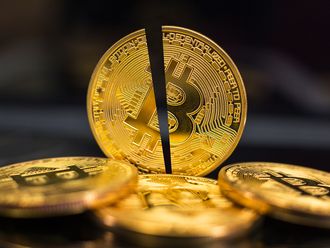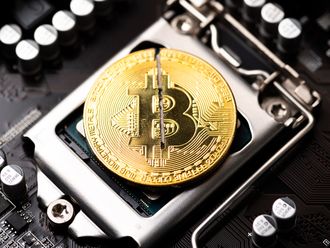The UAE Central Bank recently warned against dealing in virtual currencies, especially the most famous and traded one, Bitcoin. The bank’s warning comes after the such transactions recorded intense speculations in a period of time not exceeding two months. During this phase, Bitcoin’s value fell by 50 per cent to $1,500.
And quite unexpectedly, it rebounded in no time to $6,000 (Dh22,038) without the backing of any logical reason, reflecting the volume of speculations in a non-existent currency. We have repeatedly warned against dealing in virtual currencies, of doubtful provenance and no understanding as to who controls its transactions from behind the scenes.
Perhaps it is being controlled by criminal gangs or fraudsters who are trying to achieve sizeable profits through speculations, especially with this currency becoming a favourable choice for laundering and other illegal activities. Apart from laundering, it is regrettable to see some pursue the mirage of virtual currencies.
There is only one explanation for that — taking advantage of speculations to make a quick profit — which is a risk that so often leads to loss of investment and bankruptcy. Definitely, the attractions are becoming great when the price of a coin doubles in just a week even through it is virtual. And if there are rumour campaigns spouting Bitcoin’s value will soon reach $25,000 and maybe $100,000.
But on what basis and how no one knows.
To market the Bitcoin, the issuers leaked rumours that supply will be limited at about $41 million until 2040, which led some to quickly acquire before the coins ran out.
It is widely known that issuing currencies is subject to strict regulations governed by the central banks, which in turn determine their values or peg them to global currencies such as the dollar or euro.
A currency’s strength and its exchange rate are determined by financial and monetary fundamentals that reflect the economic situation of any country and linked to the growth rate, budget deficits, inflation, etc, which lead to daily fluctuations in the global markets.
These fundamentals, which are needed to ensure the stability of a currency, are as yet unavailable for virtual currencies that exist only within virtual reality.
If there is a strong currency, it may collapse overnight. My late friend, Dr Ahmad Al Rabie, told me his personal story to prove that. He left Kuwait the night of the Iraqi invasion to Kuwait on August 2, 1990, at 10pm, heading to Dubai, four hours before the invasion began.
He arrived in Dubai at 1am, headed to the Chicago Beach Hotel, and immediately went to sleep. Next morning, he went to exchange the Kuwaiti dinar for the dirham. He said that a hotel employee told him that the dinar was no longer acceptable, which shocked him as he had not yet known of the Iraqi invasion.
This happened despite that fact that the Kuwaiti dinar was and is still one of the strongest currencies in the world backed by huge reserves of gold and oil. So what is about the virtual currencies?
This means Bitcoin may fade within hours, either by having its value collapse from $100,000 to $1,000 or by having it disappear from the virtual market along with its virtual issuers. At the time, regret will not work about trying for quick profits based on illusions.
Therefore, the central bank’s warning should be taken into consideration as it is the competent authority that has full knowledge on financial and monetary affairs.
Dr Mohammad Al Asoomi is a UAE economic expert and specialist in economic and social development in the UAE and the GCC countries.








_resources1_16a30b358e0_small.jpg)

